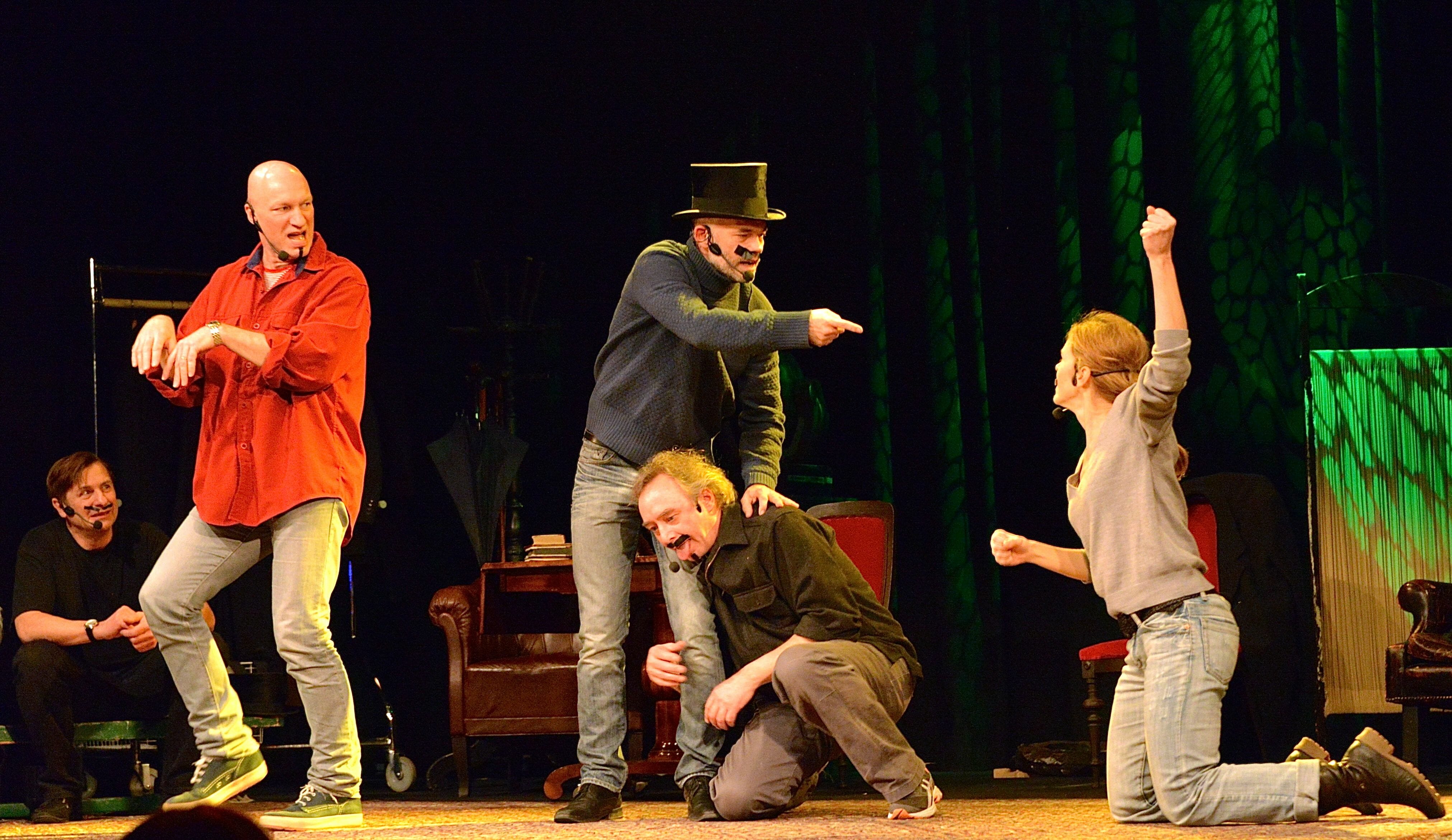
Actors performing in theatresports, a competitive form of improv
Photograph by Frankie Fouganthin
Rev. Dr. Tom Wiles
Even as I hoped and prayed that the treatment would provide relief from the effects of her disease, I feared the side effects of the toxins being pumped into her body. I was thankful for the persistence and care that led to this moment, yet anxious about the somewhat limited efficacy that this protocol promised. Hopeful and fearful, thankful and anxious, conflicted and empowered all at once. We sat silently but peacefully. There was a bit of laughter and a few words of reflection. It was obvious that no preconceived script existed for this day. Our only option was to improvise.
Improvisation was being modeled by the medical team. The treatment, described as “palliative,” was not the first option. It became the way forward only as the medical community said “yes” to the illness, despite its peculiar manifestation, and then was willing to venture into the humbling territory of “yes, and.” Yes, this is lupus, and we recommend chemotherapy. The “and”—even if not curative—provided reasonable hope for symptomatic relief. The doctors improvised and invited us to join the uncharted journey.
“Yes, and” is the essential posture for improvisation. But what is the improvisatory offer on this day, in this situation, in this life? Then, again, what else is there but free and faithful improvisation? It is the hope-filled response fitting for a life of faithful discipleship. It is marked by honesty and freedom, responsibility and risk, listening and acting, prayer and community.
Samuel Wells, the vicar of St. Martin in the Fields, London, contends, “Improvisation is inevitable. When Christians, whether scholars in a colloquium or parishioners in a house group, whether bishops in a retreat house or aid workers in a field station, gather together and try to discern God’s hand in events and his will for future practice, they are improvising, whether they are aware of it or not.”[i]
For some, improvisation conjures images of doing whatever comes to mind, whenever one desires. The word can be inarticulately used to indicate an almost thoughtless, off-the-cuff response to a particularly daunting situation. I recall my own surprise years ago at a flier promoting “Improv Rehearsal” at a stated time and place. “How does one rehearse improvisation?” I thought. Isn’t improvisation an activity that specifically refutes rehearsal? My uninformed opinion was that improvisation was not only about being original but also about being unconnected or unhinged from any previous preparation or material. Many improvisational artists, I would later learn, would scoff at my naïve observation.
Improvisation is not simply spontaneous originality. It may be original and spontaneous, but it is a spontaneity that comes from somewhere. Originality grows out of a received script and moves the narrative forward, often in surprising and creative ways, toward an anticipated or hopeful future. To access such originality requires extensive training and discipline. Gifted improvisers are shaped by principles of saying “yes” as well as “yes, and.” The “ands” are formed from an acute awareness of present context as well as a sometimes yet-to-be-articulated, anticipated ending.
Maryann McKibben Dana, in her recent book, “God, Improv, and The Art of Living,” encourages an improvisatory perspective, as she writes, “An improviser learns to see defeats with new eyes, to be attentive to unexpected opportunities even when things go terribly wrong. …That’s the vision of a true improviser. It is a hopeful orientation—turned always toward possibility.”[ii]
As my daughter and I shared those hours in the medical facility, we improvised. Our received script to which we said “yes” includes the illness that ravages her body. But that is not the entirety of the script. The bigger story includes how we have experienced God’s presence and grace. The bigger story includes our community of family, faith and friends. The bigger story envelops us in the creative and redemptive work of the Triune God. This is the story to which we say “yes.” This is the story we must know intimately. This is the story that has formed us so that we may begin to say “yes, and.” We need not be particularly clever. We need not be original. What is necessary for this moment is that we be fully steeped in God’s story—including the parts we may have previously ignored or discarded for lack of interest—so that we may now draw upon them as we move into a hopeful possibility.
In truth, our story of these shared hours is not unique. Although personal, they are universal. As Christians, we are called to live into God’s grand story of creation and redemption. It is rarely helpful to simply repeat by rote the scenes and lines from the past. But it is vital that we know the formative script. So, we improvise. We say “yes” to our story and our situation. We recognize with insight and honesty the context of our moment. We anticipate with hope. And then, with “yes, and,” we move toward Divine possibilities with freedom and faith.
Wiles will present the workshop “Improv Your Leadership” at ABHMS’ “Space for Grace: Thy Will Be Done,” November 14-16, 2018, in Philadelphia. REGISTER TODAY for this national conference that seeks to explore critical issues of mission engagement, discipleship and church transformation facing Christians today.
The views expressed are those of the author and not necessarily those of American Baptist Home Mission Societies.

